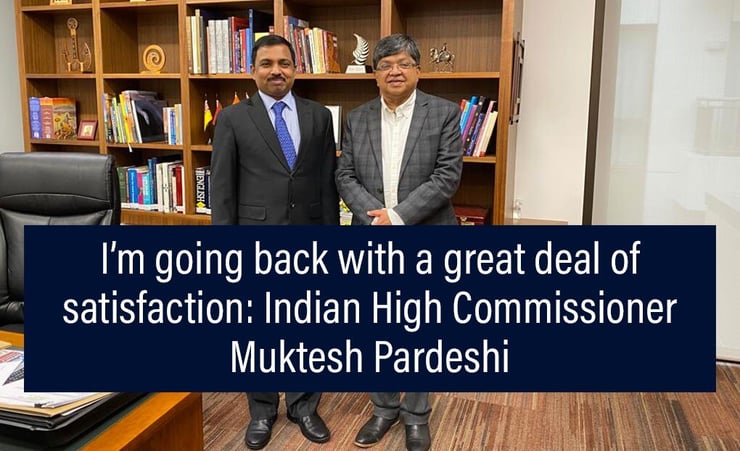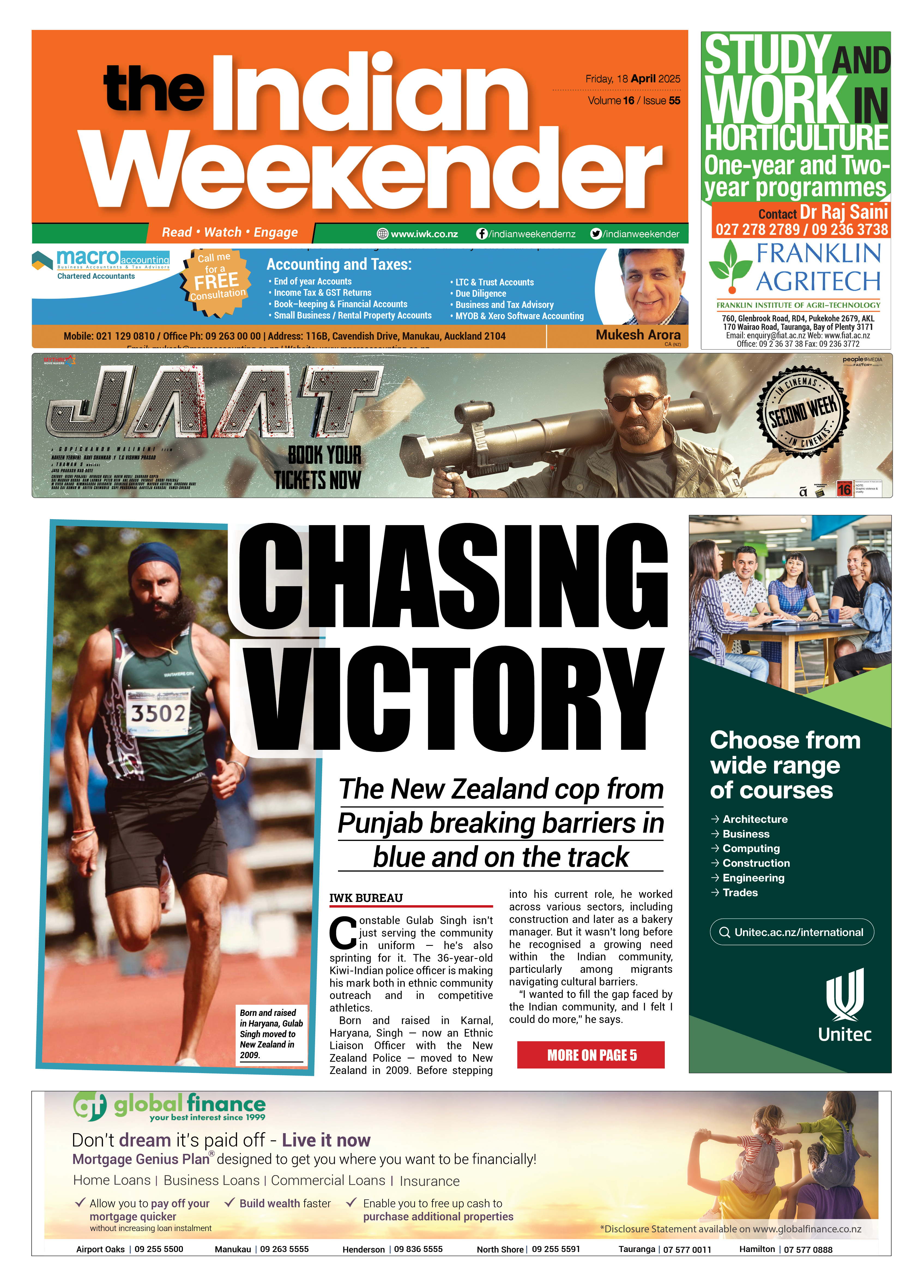‘I’m going back with a great deal of satisfaction’

Shri Muktesh Pardeshi, India’s High Commissioner to New Zealand over the past three years leaves for India next week at the completion of his three-year term. Shri Pardeshi has been among the more approachable, friendly and popular High Commissioners that has represented India in the past couple of decades. In his three-year stint, he saw through the completion of the new Chancery building in Wellington and led his efficient team to successfully navigate the range of challenges that the pandemic raised across a major part of his tenure. In his last week in office, Shri Pardeshi talked to Indian Weekender’s Dev Nadkarni about his time in NZ and the future of India-NZ relations.
On the new Indian Chancery building:
This has been in the making since 2009. We procured this plot of land in 2009 and the construction started in 2016. Unfortunately, the construction company which was building it went into receivership in August 2018. That complicated the matter. So the whole project was kind of abandoned for a year. When I arrived in July 2019, one of the foremost task before me was to restart the building, which commenced soon. And I'm happy that in spite of all the challenges that we faced, during the course of last two-and-a-half years in the form of Covid-19, we have stood resilient, we faced all these challenges. And finally we have a beautiful product.
In the seven decades of our diplomatic relationship with NZ, I think the construction of this building is an important marker in our relationship. We started in a modest manner in 1950 by setting up a trade commission in NZ. Within two years, this was upgraded to the level of High Commission. But all these years we operated from leased accommodations, which had limitations on the activities. Now with this building that phase is over, it shows there is abiding interest in NZ, we have deep commitment to the welfare of our people, people of Indian origin, who are now a significant chunk of the population here. So with this building, a dream has been fulfilled, to take our relationship with NZ to a higher level.
On his three-year tenure in NZ:
The construction and completion of this building, I would rate as one of the most visible achievements of the last three years. In spite of Covid-19 challenges, we could do significant things in terms of diplomatic contacts. Some of our meetings were held virtually. But the leadership of the two countries kept in constant contact, led principally by the foreign ministers of India, and NZ. They have in the last six months met twice, physically as well, once in Paris, and only last month they met in Rwanda, on the side lines of the Commonwealth Summit. So there has been a keen desire to keep up with the pace of political contact between the two sides.
So far as business interests are concerned, we could not have a participation in expositions. But what we did with the help of several chambers of commerce, and the India NZ Business Council here in Auckland, and Wellington, we had a series of webinars and virtual buyer sellers meet.
The last three years also provided a unique challenge. And when we had the outbreak of Covid-19 2020 onwards, we had 1000s of people stuck here, one of the one of the principal tasks before us those days was to take them to India, and their flights had close they were no way to take them to India. So we ran what is called Vande Bharat – Air India evacuated thousands of people from here, those flights also brought in New Zealanders who were stuck in India. So, these are some of the significant achievements or I would say our responses to challenges.
On how the new building will help in taking NZ-India relations to the next level:
There are three aspects to it: First is internal. Internal management of the High Commission, the way we sit in this building and operate, that becomes robust, and we become internally more efficient, space wise, and also functions wise. So that's an achievement for the internal management of the team. The external dimension is the building is also to provide services to the people. We serve thousands of people a year in terms of visa, OCI cards, passport, restoration of birth visitation of deaths, we help people for them, we can we can receive them in a more comfortable and spacious setup. In terms of provision of services to the people, and third layer of this is that the building provides a stage, a new platform for cultural and community activities. Now, we have events every week – in less than three weeks, we already had four events. We have started yoga classes and also launched a special yoga session, every Saturday, for diplomats and their spouses. But for this facility, I could not have done this.
Through your channel, I would like to reach out to any person of Indian origin anywhere in NZ. If they are coming to Wellington, and they have some time, please come present your paper, give your talk at the premises of the High Commission of India, we'd like to collaborate with you not only on the cultural area, we would be delighted to work with you and provide a platform at the High Commission.
On Indian High Commission in Wellington now being accredited to four other Pacific countries:
NZ has a significant presence. It's a Pacific country, it has significant connections and projects in the Pacific region. And then in terms of connectivity, both air and otherwise our mission in Wellington is better placed to look after relations with some of the Pacific Island countries. So when I joined I was responsible for covering two more countries, Samoa and Niue. And in the course of my tenure, two more countries have been added the Cook Islands, and Vanuatu, it will become easier for the High Commissioner based in Wellington to travel to these countries. These countries also have diplomatic missions here. So it becomes easier working with them.
On Vande Bharat mission and the possibility of direct India-NZ flights:
I'm optimistic it should be happening one day as you are aware that during when Vande Bharat flights were mooted in the beginning, we were not sure whether we'll be able to cover the long distance between Delhi and an Auckland. But direct India flights have proven that. Both sides are keen to improve on connectivity. There is some revision going on to the Air Services Agreement signed in 2016 and both sides have given inputs on it. Now when things are resuming and people are going for international travel, at some point of time, the airlines will take a commercial decision to operate in this sector. I think it should be coming in a few years.
On NZ-India trade and what role diaspora can play:
There is no free trade agreement. But then trade growth has not been so visible as we would like to see. During last two years from our side exports have jumped from India to NZ, from NZ side, because of service exports, no students were coming and tourism got hit. So the contribution of service sector has been affected from the NZ side. In some years, our bilateral trade reached up to around 3 billion NZD but due to difficulties during the Covid-19. It's around 2 billion, but I'm sure it will pick up. We have to create familiarisation about NZ and Indian products. We would like to encourage Indian business people to come to NZ and see for themselves both exports as well as investment opportunities here. Similarly, for NZ business people in India provides a huge market, but they should not be looking at India only in the export market. So, now, when the travel has resumed I invite NZ business people to come to India see for themselves the new opportunities that India is offering under the concept of Atmanirbhar Bharat, which is not in any way protectionist policy.
Some of the Indian community have been very successful, and can contribute through investing in India in certain sectors, whether it's the hospitality sector or restaurants or in agri-processing. I have been told that geographical conditions in the Northeast of India is very suitable for cultivation of say kiwifruit. The other day I was speaking to Zespri that they should go and see the Northeast whether kiwifruit could be introducing them region. These are the new opportunities.
On the way forward for India-NZ trade relations:
I'm very happy that after a gap of more than 10 years, for the first time a joint trade committee has met in New Delhi in the last week of June. The joint trade committee was formed some 30 years ago, during the visit of the Prime Minister, Shri Rajiv Gandhi, so there was a trade agreement signed between and to implement the objectives of the trade agreement, a joint trade committee was set up, how does it work, the committee looks at complementarities, looks at regulatory framework of each other, and also market access issues. So they have met recently in Delhi, and I'm sure they would have discussed roadmap, how to take our business partnership forward. It is true that RCEP did not happen for India, we did not participate. But India has signed up a bilateral economic cooperation agreement with Australia, there are some FTA signed with UAE.
It is possible that such a deal might happen with NZ. If it was not possible, it would not have happened with Australia. Now what had happened with Australia provides a template for study by both sides. So if there are economic think tanks here. This should be an important task for INZBC to study what has happened between India and Australia, take ideas from there, and at least pretend to the government that the complementary aspects in our business partnership. So a lot of work has to be done. While officials remain engaged, the business community at the same time should give ideas after studying the India, Australia, partnership.
On his experience in NZ:
NZ is a beautiful country and people are so friendly and nice. We never had any sense of friction at either the level of diplomatic relations or even the people to people level. So working and living in a country like NZ is always a pleasant experience. So we are going back with happy memories but two-three things which we'll always remember: I think the contribution of the people of Indian origin in the development of India NZ relations is commendable. We have seen during last two, three decades, and that's also part of diaspora policy to create synergy with the diaspora, and work towards furtherance of interests and values of India. In NZ, our community is well integrated, they are law abiding. And I find many examples of success, they are contributing to national GDP. And we did a common study, where it had been shown that the people of Indian origin are contributing $10 billion to the economy. So their contributions will always remain in the back of our mind. And during the Covid-19. The High Commission team struggled a lot. While they were several lockdowns in the country, we did not slow down even for a single day. So I'm going back with a great sense of personal satisfaction, that in spite of all these challenges, our team remains resolute and united to deliver something like the president, the high commission, so I will always have a very happy memory of the fact that we could create this against the backdrop of the Covid-19.




